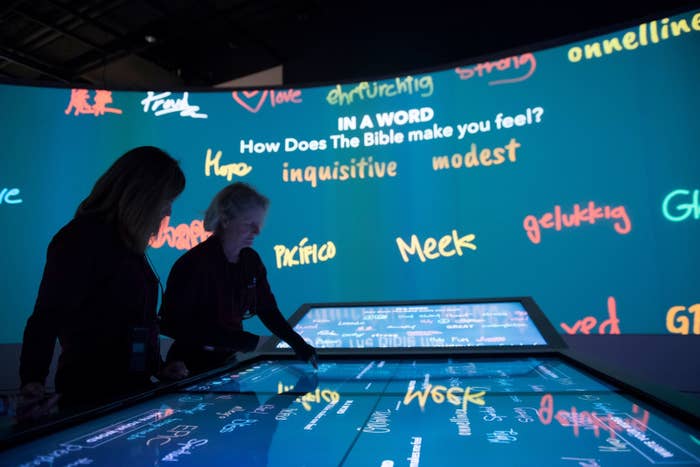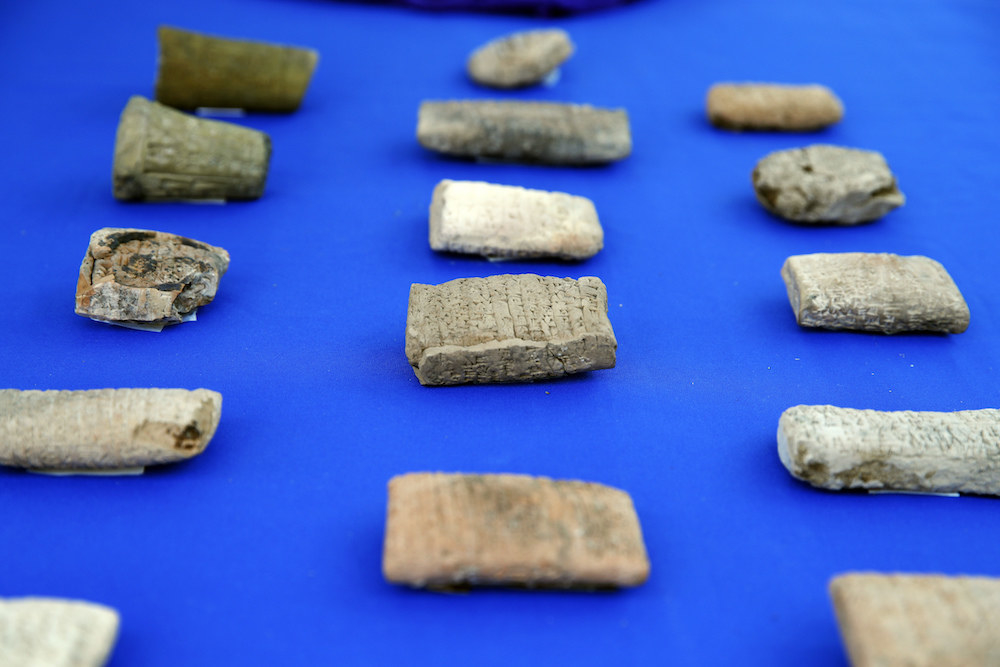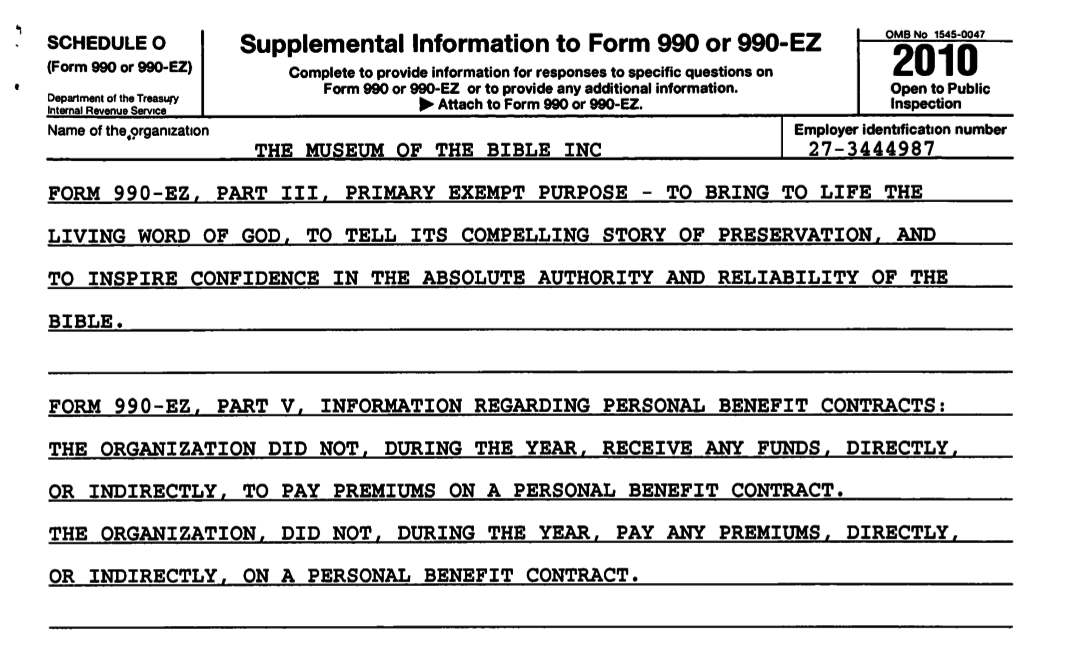
The Museum of the Bible’s grand opening gala last November wasn’t held in its new $400 million shrine to the scripture near the Capitol. Instead, funders and fans convened at the Trump International Hotel, where Eric and Lara Trump tweeted a selfie with the hashtag #MuseumOfTheBible.
The soiree was a toast to the conservative evangelical founders at Hobby Lobby who hoped their venture could imprint a specific brand of biblical literalism on America — a toast that came four months after the company was sued for smuggling religious artifacts into the United States.
Now, one year later, Christian conservatives have further cozied up to Trump, and the staff who run the museum day-to-day face a problem.
Black people are noticeably underrepresented, as are people of color generally, while visitors the first year were less than one-third of capacity, Seth Pollinger, the director of museum curatorial, said in a recent interview.
“We need to include more people of color,” he told BuzzFeed News, noting that the DC area is famously diverse; the city is majority-minority, although the black population has dipped below 50% in recent years. The museum reported about 1 million visitors since it opened, but it can accommodate many more, up to 10,000 per day. “The early objective favored a white Protestant perspective,” Pollinger said.
“People have wondered, ‘Are you really inviting all people, or is there an inherent bias to the initial funders?’” he said.

The museum is trying to repackage itself with the communities who were sidelined at its conception, and people whose political views clash with the funders who still oversee it. The museum's operators, not the board, are leading this charge.
The Museum of the Bible, dubbed MOTB, is attempting to correct course with a blunt rebranding. The latest overture to African Americans, which comes after months of conversations with black leaders, includes a Slave Bible exhibit, launched Wednesday, which was announced in an op-ed by Rev. Jesse Jackson. The exhibit revolves around an abridged copy of the testament handed out by white British colonialists in the 1800s, who had gutted the more egalitarian books — Revelations and Exodus, for example.
The Slave Bible was used to convert slaves without all that “let my people go” business.
It did, however, retain lines like, “Servants, be obedient to them that are your masters.”
Jackson intoned in the New York Amsterdam News, a black newspaper based in Harlem, “I urge everyone to see the powerful exhibition.”
Beyond the latest exhibit, however, the museum is burdened by cultural, political, and legal luggage — a trifecta of stigma that museum curators are now trying to shake with a task force, partnerships, and closer ties to the region’s black pastors.
The museum's board of directors has one black member, and none of the museum's executive staff are black, Pollinger said when asked about the upper ranks. This raises a question about whether attracting visitors of color is primarily about burnishing the museum’s tarnished reputation rather than shifting its underlying character.

The museum paired up with the National Museum of African American History and Culture, a project of the Smithsonian, and beefed up black voices on its advisory board. They’ve also involved Rev. Matthew Watley, the executive minister of Reid Temple, a historical black church in DC, who said in a statement, “While the abridged Bible was used as a book of oppression, the Bible today, indeed, is a book of freedom and hope for all communities.”
Next month, the museum will debut Revival!, a gospel musical of the Book of John, featuring several celebrities of color, including Harry Lennix, Chaka Kahn, and Michelle Williams of Destiny's Child.
In September, former Airbus executive Ken McKenzie became the museum CEO, and the next month, it named Rena Opert, a Jewish woman, as the new director of exhibits.
“We really want to enhance the brand,” said Pollinger, who said people of color have expressed misgivings about the museum’s limited audience. “There are rumblings and hesitations out in the community.”
“I hope the Slave Bible is an effort to broaden that tent and see what it looks like to invite all people to engage with the Bible,” he added.
But it is simply impossible to discuss the museum, or its reputation, without evoking who is behind it and its flubs.
The museum’s founder and chair, Steve Green, is also the CEO of Hobby Lobby — the craft store chain behind the Supreme Court case that successfully argued to let employers deny contraception in the name of religion. Hobby Lobby was also charged with illegally smuggling ancient artifacts from Iraq, leading to a $3 million settlement with the Justice Department. The museum later concluded that five Dead Sea Scroll fragments on display at the museum were likely forgeries.

The Green family was the museum’s founding benefactor, a family led by David Green, who donated $25,000 to help elect Trump in 2016 while giving $22,000 more to the Republican National Committee, according to election finance records.
With some of my favorite people! #MuseumOfTheBible
The Greens also shaped the museum’s charter and leadership. The “primary purpose” for the museum upon founding, according to 2010 IRS tax reports, was “to inspire confidence in the absolute authority and reliability of the Bible” — which reflects an evangelical belief in rigid textualism over interpretation.
“There has been a history of actions that could be, at the least, perceived as favoring a white Protestant audience,” Pollinger said. “We need to expand our offerings.”
The museum is officially nonpartisan and nonsectarian, and its opening featured a separate event in the museum itself featuring DC Mayor Muriel Bowser, a black woman and Democrat. It has also recognized black figures in the past, and its revised purpose on tax forms is to "invite all people to engage with the history, narrative, and impact of the Bible." But conservative politics have been infused since the start.

Just before the grand opening, Steve Green told Time magazine, “We think Congress ought to know the foundation of the nation that they are running today,” adding, “We would hope the White House, whether it is the current president, former presidents, future presidents, we would invite all people to come and know about this book.”
“The current administration with President Trump is a friend of religious freedom,” he told the Christian Broadcasting Network, according to the Washington Post.
The board of directors features Rick Warren, who both backed Hobby Lobby’s religious freedom lawsuit and instructed his massive congregation to help repeal same-sex marriage rights in California. It also includes Gregory Baylor, senior counsel for Alliance Defending Freedom. That group argued at the Supreme Court that it was legal to ignore a Colorado civil rights law protecting gay customers because a Christian baker didn’t want to make them a wedding cake.
This juxtaposition of white religious evangelicals with civil rights leaders is ironic. The leading goal of the conservative Christian legal movement is to argue that religious freedom creates a loophole in nondiscrimination law — undermining the foundation of civil rights law.
If the absence of black people was seen as a symptom of a deeper illness at the museum, the question is whether black people's appearance (and some exhibits) fixes the problem of the museum's founders.
BuzzFeed News asked Steve Green, through both the museum and Hobby Lobby, if he supported the Slave Bible project and broader outreach to visitors of color. After this story's publication, he emailed a statement backing the exhibit.
“The Bible has had a profound impact on my family and on me personally," he said. "We have a great love for this book, and our vision for creating Museum of the Bible was to invite people of all walks of life to engage with the Bible. We wholeheartedly support any effort by the museum to reach more people and endorse this new ‘Slave Bible’ exhibit that provides an important historical look at how the Bible was edited for use as a book of oppression when its true message is one of freedom and hope.”
UPDATE
After this article's publication, Green emailed a statement expressing his support for the Slave Bible project.
CORRECTION
The Bible Museum has one black person that serves on its board. Based on information from Seth Pollinger, the museum's curation director, a previous version of this story said there were none. After publication, Pollinger corrected himself.
